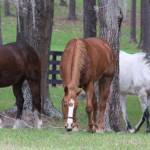What is Typical for Horses with Atypical Myopathy?

For many years, atypical myopathy proved a mysterious disease in horses with devastating consequences. Researchers now know that this incurable, often fatal disease develops after ingestion of a toxin called hypoglycin A (HGA), which is found in the seeds of certain plants, including sycamore maple trees. One recent study reported that HGA isn’t the only toxin that causes atypical myopathy, with other culprits, including methylenecyclopropylglycine or MCPG, identified*.
“Acer trees and other plants containing HGA and MCPG are widely distributed throughout North America and Europe, making certain pastures potentially unsafe for grazing. This holds particularly true for younger horses that have more adventurous palates than older horses and are more likely to consume tainted seeds,” explained Kathleen Crandell, Ph.D., a nutritionist for Kentucky Equine Research.
To better understand the role of MCPG in cases of atypical myopathy, a team of German veterinary researchers collected blood and urine samples from 14 horses. All horses had ingested Acer pseudoplatanus seeds and subsequently developed signs of atypical myopathy, such as muscle pain and weakness.
“This study found that HGA and MCPG were identified in both urine and blood samples of affected horses. Further, MCPG, like HGA, blocked the process of beta-oxidation, which is how the body creates energy from fat, a common process in muscle cells,” relayed Crandell.
Based on these results, the researchers wrote, “In addition to HGA, MCPG is involved in Acer seed poisoning of horses. This finding has to be taken into account for the description of the exact pathomechanism of atypical myopathy. A deeper insight into the pathogenesis is important from the point of view of applied veterinary medicine because only a precise understanding of pathogenetic mechanisms will lead to the development of a specific therapy, which is still missing.”
In addition to previously described management strategies to avoid Acer seed poisoning, owners can use local extension specialists to help scrutinize pastures for the presence of toxic trees and plants. In addition, Kentucky Equine Research nutrition advisors can help select alternatives to pasture in the spring and fall when incidence of atypical myopathy peaks.
*Bochnia, M., J. Sander, J. Ziegler, et al. 2019. Detection of MCPG metabolites in horses with atypical myopathy. PLoS One. 14(2):e0211698.








